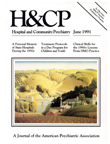Treatment Cost and Rehospitalization Rate in Schizophrenic Outpatients With a History of Substance Abuse
Abstract
Retrospective self-report data from 60 chronic schizophrenic outpatients in a community support program (CSP) were used to study the relationship between a history of substance abuse and rate of psychiatric rehospitalization and outpatient treatment cost. The sample showed a significant overall reduction in days spent in a psychiatric hospital or jail and in outpatient treatment expenses during the first year in the CSP. Although subjects with recent symptoms of substance abuse (N=27) showed consistently smaller reductions than subjects with no history of substance abuse (N=17) or subjects with no recent substance abuse symptoms (N=16), the only significant difference between the groups was in the total number of days spent in an institution. However, the findings suggest that treatment of patients with concurrent substance abuse and schizophrenia is disproportionately more costly than that of patients without dual diagnoses.
Access content
To read the fulltext, please use one of the options below to sign in or purchase access.- Personal login
- Institutional Login
- Sign in via OpenAthens
- Register for access
-
Please login/register if you wish to pair your device and check access availability.
Not a subscriber?
PsychiatryOnline subscription options offer access to the DSM-5 library, books, journals, CME, and patient resources. This all-in-one virtual library provides psychiatrists and mental health professionals with key resources for diagnosis, treatment, research, and professional development.
Need more help? PsychiatryOnline Customer Service may be reached by emailing [email protected] or by calling 800-368-5777 (in the U.S.) or 703-907-7322 (outside the U.S.).



